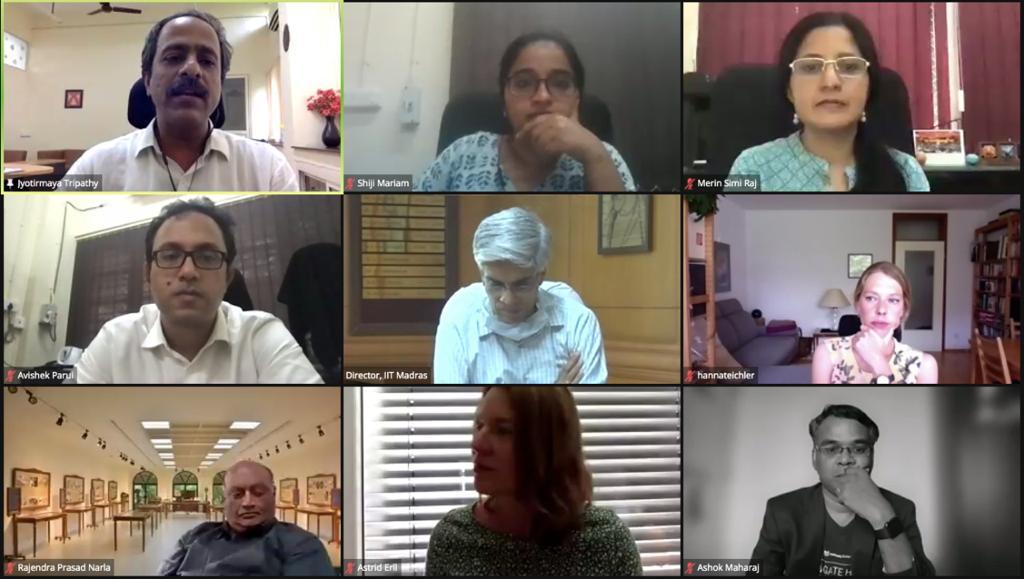Indian Institute of Technology Madras has launched the ‘Indian Network for Memory Studies’ (INMS), the first formal national network in the field of Memory Studies in India and Asia, which has been formed under the aegis of the international Memory Studies Association (MSA), Amsterdam.
The INMS will coordinate complex engagements with ‘memory’ from different institutes including cultural studies centres as well as neuroscience laboratories and industry research on AI and related fields, IIT M said in a release.
The Network was inaugurated virtually on June 16, 2021 in an event witnessed by around 600 participants from India, Iraq, Finland, France, Germany, Mauritius, Sweden, U.K., and the U.S.
The Indian Network for Memory Studies is founded by Avishek Parui and Merin Simi Raj, Assistant Professors (English), Department of Humanities and Social Sciences, IIT Madras, who will also be its Chairpersons.
Parui is also a nominated member of the Advisory Board of the International Memory Studies Association. The Indian Network for Memory Studies has emerged from the Centre for Memory Studies, IIT Madras, which has been funded by the Ministry of Education, Government of India. The other funding to the current projects in this research cluster comes from XR Lab, TCS Chennai, and Anglo-Ink, Chennai.
IIT Madras Director Prof. Bhaskar Ramamurthi said, “This Network has already built a commendable critical mass which reflects its relevance and reach Success in this case will be to get the activities going, establish lot of collaborations, conferences, workshops and form a community of people working in this field.”
“For India, memory studies can be very important, for a lot of historical developments are captured only in memories and not on documentation,” Ramamurthi added.
He said, “The fact that there are so many participants from India too has shown that this network has not come a day too soon. There is enough work going on in India to warrant the creation of such a Network. There is a good base for creating this network in India and it can plug into the huge global network.”
The vision of Indian Network for Memory Studies include:
- Offering an India-centric model of memory studies departing from the established Eurocentric models in theory and practice.
- Producing and promoting an innovative interdisciplinary engagement with the complex cognitive, cultural, and machinic modes of memory.
- Examining the processes of encoding and effacement that simultaneously inform acts of remembrance and re-construction in private as well as shared orders, and how such processes may be recorded as well as represented by a range of fields such as fiction, history, media, urban geography, and technology.
- Producing exhibitions, conferences, workshops, and special journal issues on a range of themes in Memory Studies, in collaboration with partners from academia and industry.
- Academically accentuating as well as promoting the rich research on imperialism, Partition, and post-colonial identities through the interdisciplinary lenses of memory studies.
- Re-creating Indian and South-Asian pre-colonial, colonial, and postcolonial events and identities using the model of memory as reconstruction, foregrounding the textuality and the technology informing processes of remembering.
Speaking on ‘The Pleasures of Memory Studies,’ Prof. Astrid Erll, Goethe-Universität Frankfurt, Director, Frankfurt Memory Studies Platform, identified the pleasures of memory studies in its ‘internationality,’ ‘interdisciplinarity’ and ‘ongoingness.’
Prof. Erll said, “My definition of Memory Studies would be an interplay of present, past and future in socio-cultural contexts. Memory is a biological, social, material and cultural phenomenon and increasingly a technological phenomenon.”
Prof. Astrid Erll noted, “What has happened in the last two decades is that Memory has become more and more instutionalised. In 2016, a group of memory scholars realised that they needed to have a global platform. Hence, for the past five years, we have an International Memory Studies Association to facilitate this global collaboration. MSA India is the latest entrant to this association.”
Avishek Parui and Merin Simi Raj have already established partnerships for the Indian Network for Memory Studies with the Memory Studies Association, Amsterdam, Frankfurt Memory Studies Platform, Germany, Memory Group, University of Warwick, U.K., Cultural Identity and Memory Studies Institute (CIMS), University of St. Andrews, U.K., XR Lab, TCS and Anglo-Ink, Chennai. They have also facilitated an MoU with the University of St. Andrews.
Parui and Simi Raj aim to offer an entirely original perspective on studies in national memory, history, and cultural identities, drawing on theoretical models from humanities research as well as innovative tools of technology.





